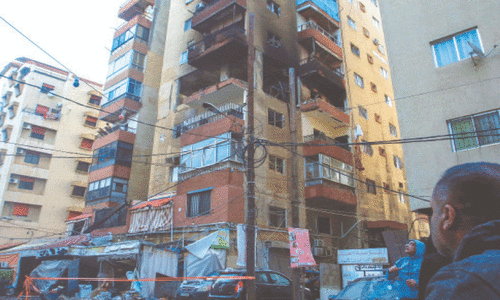• SC to hear PTI leader’s plea today on need for physical custody to complete investigation
• Apex court moved for early hearing of PTI appeal challenging high court’s rejection of plea seeking de-notification of 123 MNAs
ISLAMABAD: The Islamabad High Court (IHC) on Thursday finally granted post-arrest bail to PTI leader Dr Shahbaz Gill, and ordered his release against surety bonds of Rs0.5 million.
The PTI chairman’s chief of staff has been nominated as an accused in the first information report (FIR) registered against him for inciting mutiny within the armed forces during an interview to a TV channel.
Meanwhile, the Supreme Court will consider on Friday (today) Gill’s plea highlighting if the physical custody of an accused was necessary to complete investigations in criminal cases.
In the IHC, Gill’s counsel Barrister Salman Safdar mainly argued that no offence was made out against his client and that the registration of a criminal case was politically motivated and based on mala fide.
Special Prosecutor Raja Rizwan Abbasi argued that Gill’s speech aired by ARY News was sufficient to attract the offences mentioned in the FIR; he had abetted and attempted to incite members of the armed forces to disobey lawful orders of their superiors, and thus committed mutiny.
In response to a court query, the special prosecutor conceded that during the investigation, no incriminating material could be collected to indicate that before or after making the statements, Gill had contacted any officer or other members of the armed forces with the intent to abet or attempt to cause incitement.
He stated that Section 131 of the PPC explicitly provides an offence is committed when a person abets the committing of mutiny by an officer, soldier, sailor or airman in the army, navy or air force or attempts to seduce any such officer from his allegiance or duty. The prosecutor also submitted the transcript of Gill’s statement before the court.
IHC Chief Justice Athar Minallah noted: “Such reckless statements were not expected from a person who claims to be an academician and is held out as a spokesman of a political party.”
The chief justice pointed out that the trial court was satisfied that except the offence described under Section 131, the other offences mentioned in the FIR were, prima facie, not attracted. He also observed the prosecution had not brought on record any material to show that a complaint was received from or on behalf of the armed forces. He added the discipline of the armed forces was not frail or weak to be affected or influenced by “reckless and irresponsible statements” made by those who claimed to be political leaders.
Despite the reckless statements made by Gill, a case for further inquiry was made because a probe was required into whether the offences mentioned in the FIR would be attracted solely on the basis of a speech.
“The investigation has been concluded and Shahbaz Gill is no more required to be incarcerated,” said the court order, adding that in such an eventuality his incarceration would not only be futile, but rather amount to punishing him before the conclusion of the trial. Moreover, nothing could be brought on record to persuade the court that if released on bail, Gill would repeat the offence, tamper with evidence, influence the witnesses or abscond.
Custody in criminal cases
Meanwhile, a three-judge Supreme Court bench, consisting of Justice Ijazul Ahsan, Justice Sayyed Mazahar Ali Akbar Naqvi and Justice Jamal Khan Mandokhel, will take up a petition moved by senior counsel Barrister Salman Safdar on behalf of Dr Shahbaz Gill, challenging the Aug 18 IHC order that referred the issue of remand to the Islamabad additional sessions judge who had extended his physical custody.
The petition also questioned if the approval of the federal government, as defined by the apex court in the 2016 Mustafa Impex case, was a mandatory precondition prior to registration of a criminal case on charges of mutiny and sedition, and whether the absence of permission by the federal cabinet would render the arrest, detention and remand an exercise in nullity, causing grave miscarriage of justice.
It also questioned whether the 14-day remand and physical custody of an accused was justified in the present case of mutiny and sedition when the allegations primarily revolved around a speech.
And whether the alleged torture and physical abuse during police custody and interrogation could be justified under the Constitution as well as the CrPC along with the Police Rules, the petition questioned, also asking if the IHC order of appointing the police chief to investigate the allegations of torture and physical abuse by the police operating under his command could ensure digging out the truth.
Challenge to IHC’s plea rejection
Separately, the PTI moved an application for early hearing of its challenge to the Sept 6 IHC rejection of a similar plea seeking a direction to the Election Commission of Pakistan (ECP) to de-notify its 123 MNAs.
Moved through senior counsel Faisal Fareed, the petition also requested the apex court to fix the matter on Sept 16 since the ECP had announced by-elections on piecemeal basis when the commission was bound to hold elections on all the vacant seats within 60 days. It also pleaded that the piecemeal acceptance of resignations of PTI lawmakers and elections on the few seats was based on “colourful exercise of power”.
Published in Dawn, September 16th, 2022














































